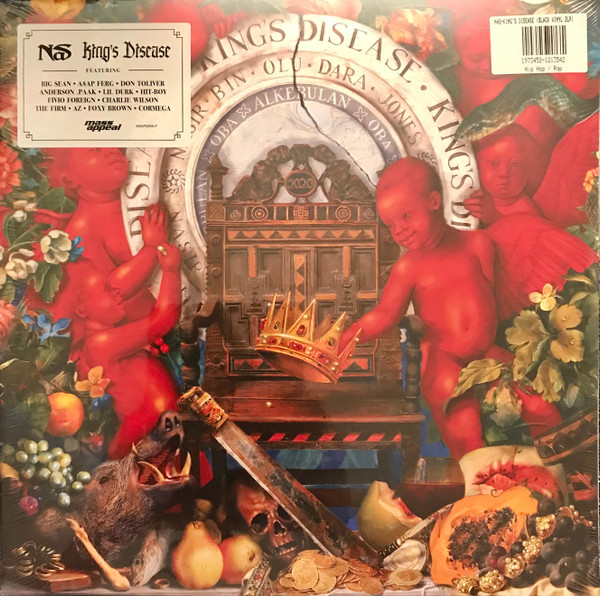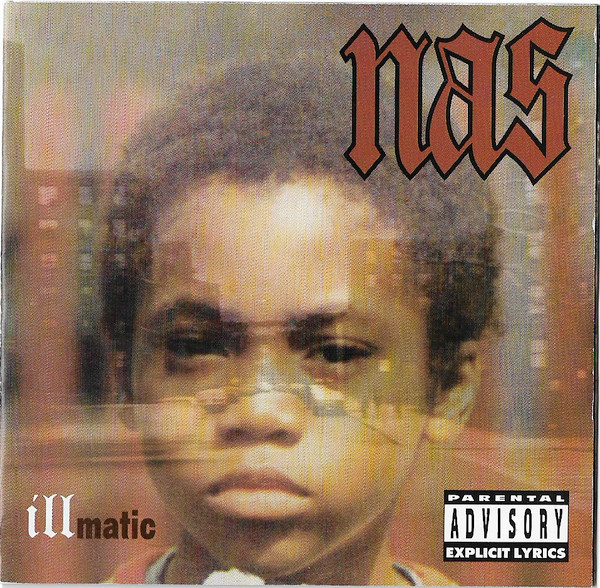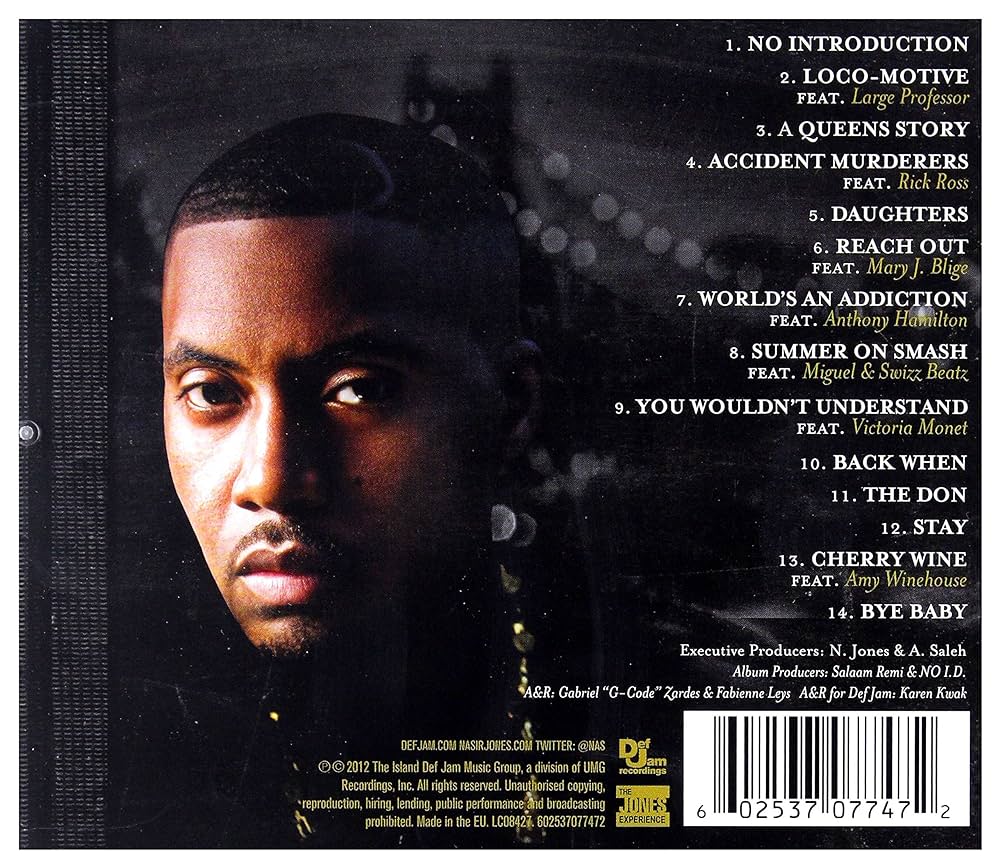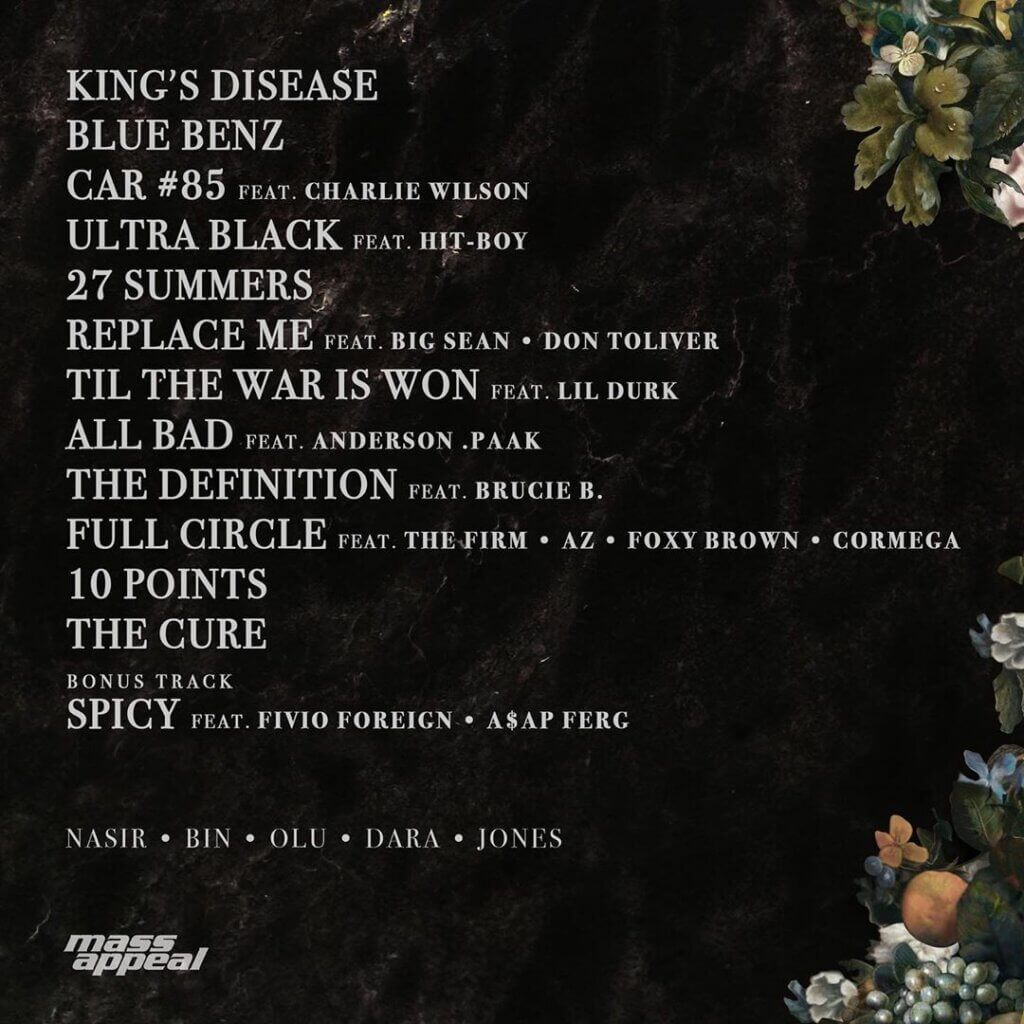“King’s Disease” is the title of an album from New York rapper Nas. It was released on the 21st of August in the year of 2020. The album was distributed by Mass Appeal Records and marketed by Universal Music Group. The majority of the 12 regular tracks and 1 bonus track were produced by American producer Hit-Boy.
The album features guest appearances of multiple other artists like Nas’ old rap group The Firm, Big Sean, Don Tolliver, ASAP Ferg, and a few more surprise acts. “King’s Disease” is Nas’ thirteenth studio album.
Story of the Album
The album’s opener is titled as the album: “King’s Disease”.
Right from the start, the executive producer Hit-Boy displays his masterful skills. The man is one of rap music’s finest beat engineers. He delivers a well-placed canvas for Nas with some chords and a royal classic sample:
The stupidest part of Africa produced Blacks that started algebra Proof, facts, imagine if you knew that as a child, bruh
Over the strings of the beat, Nas shows why he is one of the greatest storytellers in rap. His lyrics are sharp as a diamond knife and he starts the concept of the album off well, hinting at what kings actually must go through to get to the top. This creates a rock-solid vibe to an increasingly promising album:
It's so lame, this media circus greedy and worthless My life got 'em tight, why they wanna see me hurt up? (Why me?)
Most likely, Nas refers to the numerous media-blown-up stories regarding claims of his abusive relationship with his ex-wife. He will continue the jabs on the media throughout the album. I will discuss them in a later part of this review.
The first track does what a good introduction is supposed to do: it makes the audience curious. We can already tell after listening to it, that “King’s Disease” is going to be a widely reflective album with lots of food for thought.
Take a Trip Down Memory Lane
The title of the third track, “Car #85”, is a reference to the most popular cab in New York during Nas’ early years growing up on the streets of N.Y. City.
The first thing that jumped out at me when listening to “Car #85”, was the amazingly nostalgic beat. Again Hit-Boy created a perfect canvas for Nas, who did what he does best over it: telling an engaging story from his past about his defining events of his childhood, riding to different locations, meeting different people and dealing with break-ups from women:
And I was talkin' to Tia I went to her block, I was just happy to see her And low was how she did me (Ooh) She moved from Queens to Co-Op City (Ooh-wee) She said, "Visit me, that's if you really miss me" (I did), show proof Ten niggas outside her buildin', that's what I go through (Damn)
Ultra Black
The album’s lead single and “King’s Disease” blueprint is definitely the track “Ultra Black“. It is a powerful display of strength, pride, and optimism. It represents overall positivity for black culture all over the three verses. The mentioned characteristics are most notably displayed on the hook:
We goin' ultra black, I gotta toast to that We don't fold or crack (We goin') Occasion, we rose to that, fuck goin' postal (Uh) We goin' ultra black Watchin' the global change, hop in the coldest Range Hit-Boy on the beat, this shit 'posed to slap We goin' ultra black, we goin' (We goin') We goin' (We goin') uh
No matter the race, one can’t help but shout the incredibly strong lyrics along with Nas. The track adds yet another reason for hip-hop having become the most popular musical genre in the world and black artists rightfully overtaking mainstream media:
Rhythm and blues, pop, rock to soul to jazz 'Til my toes are tagged (Uh) How I look being told I'm not supposed to brag? Nobody fault, I tell the truth, I know it's facts, we ultra black
“Ultra Black” is an intensely powerful statement and a further milestone in Nas’ career. It is not just its lyrical and musical content that make it so engaging, but it’s the overall message the track delivers to society as a whole:
Black is beautiful
And it is.
From Illmatic to Stillmatic
When Nas started rapping at a very young age, it was just that for him. He walks back to the start of his career in “27 Summers”. He tells what it all was about for him at the time and how proud he is off his people making it alongside him too:
All my niggas millionaires, G-Code know what's up (What up, G-Code?) What up, Jung'? What up, Stoute? What up, Ant? What up, East?
The mentioned people are all relatives and close friends of Nas. However, it are not just his close people he is proud off. It is his culture, black culture as a whole, that he feels the strongest emotional connection to:
Rich, matte-black Rolls, yeah, I got 'em seeing ghosts (Ghosts) Twenty-seven summers, that wasn't even the goal (Goal) Blowing kush clouds and we all for the smoke (Smoke) Black card, black Rolls, more black CEOs
Passing the Torch
“King’s Disease” is not just about bringing Nas over. To the same degree, Nas looked out to establish new kings in the field of rap and gave them their well-deserved moments of glory.
The most prominent example of the above mentioned is the track “Replace Me”, where he featured two of hip hop’s younger artists, Big Sean and Don Toliver. Both of them paid their dues already a long time ago and established themselves as future kings.
At the end of his verse, Nas leaves a very profound statement on another symptom of “King’s Disease”: mental fatigue from always being in the limelight:
If it didn't occur (Huh?), she for me, I'm for her (Running) Only thing worse than being alone is wishin' you were
While Big Sean raps a lot of really corny bars on the track, he also displays great ones:
I know that you believe in stars And just like stars, you know your words got a lot of power
Don Tolliver on the other hand does a phenomenal job delivering the hook to the track. The man just nails it and leaves a strongly affirmative imprint in listener’s ears:
It get kinda hard to replace me (Kinda hard to) So don't go lookin' for nobody else I was keeping my heart there on safety (Heart there on) But now I'm letting it go until ain't none left (Yeah)
Production
Almost every track on the album was, as already mentioned, produced by Hit-Boy. And boy did the man a good job.

It is especially Hit-Boy’s eye for detail that jumped in the ears when listening to “King’s Disease” for the first time. Be it the samples, different chords or snare drums, the man just knows how and where to place them.
The beats all fit together perfectly and overflow as smooth as water from one track to the other. With his production, Hit-Boy made sure that the album can be played in and out on repeat without the slightest glimpse of boredom coming up.
When it comes to the beat selection, Nas’ taste as well evolved since his debut 29 years ago. The instrumentals of “King’s Disease” all sound fresh as lemon grass and are clean-cut, a lot of them being new-school trap beats.
Til the War Is Won
The homage to women continues in the track “Til the War is Won”. In it, Nas refers with others to his early gone mother. It is a very deep piece of music and I had to listen to it a few times to fully get what Nas was is dealing with:
Single mothers, my heart's bleeding for you These coward men, that were beating on you (Never me) Let's silence them with a silencer For the violence of relationships
As I hinted in the introduction chapter, the quoted line is a reference to a controversy that follows Nas from 2018 on. He was accused by his ex-wife Kelis of domestic violence during their marriage. Nas to this day claims to be innocent. He also is a father of a daughter, one which he admitted not having been the best parent to in a recent song.
He went into detail about the relationship to his daughter on his 2011 track “Daughters” of his album “Life Is Good”.
All Bad
The song “All Bad” is again a very retrospective and reflective track about women. It features a thoughtful and calm Nas who does a phenomenal job at transporting his emotions in his lyrics:
Texting me that they hate my one-word answers Here's two, call me, this is you stalling Guess we through, you ignore me, days go by Missing you be the worst, play the game, who gon' hit who first
The Definition of Rap
On the “The Definition”, Nas teams up with Brucie B, who does the intro as well as the outro.
The beat of the track is very uplifting and fast-paced. With it, Nas increases his delivery speed significantly on his single verse:
I'm talking the law for me, freedom is illegal Tape telephone conversations, what kind of nation Got three hundred million people they investigating? I know they're tryna watch me, a Russian oligarchy
He openly criticizes the government of the United States for spying on people who they consider threats to the status quo. And again it seems like he refers mostly to black people. At the end, just as the title of the track suggests, he defines what the “King’s Disease” actually is:
The definition of King's Disease Well, also known as rich man disease You ain't gotta be rich to get it Just doing too much, you'll get it
He is referring to the Gout disease, a disease that gets the uric acid levels up high and with it causing pain and swelling in one’s joints.
The Hall of Fame of Rap
The track “Full Circle”, features the Crème de la Crème of rap. Nas reunites with his former rap group “The Firm” featuring himself, A.Z., Cormega, and Foxxy Brown. The group was introduced and formed on Nas’ second album, “It Was Written”. Just a year later, however, they got released by Dr. Dre due to a disastrous commercial debut.
The track starts with Nas himself, who pulls out his storytelling abilities. He again refers to his women problems. This time, however, he uses women as a metaphor, for his past:
So what you gon' do now, Goldie? Your bottom left you It's up to me and you, Goldie, through introspection You ain't Goldie, you Nas, and my heart ain't cold as it was And I go through multiple love triangles over and over enough
This time he admits that he just can’t get over some events of it. His relationships to women always go the way they go because of his past.
The second verse is delivered by AZ. He does an equally as good job as he did 29 years ago on “Life Is a Bitch” and again confidently takes his crown for the best guest spot on an album back.
The last two verses are delivered by Cornega and Foxxy Brown. Both of them laid brilliant verses. While Cornega is as well refers to women he had relationships with, the second, Foxxy Brown, masterfully raps about prior released albums as well as classic singles, cleverly packed into metaphors and smart wordplay.
And as if this wasn’t enough, we get one more golden nugget on “Full Circle”. It is none other than Dr. Dre who raps the outro of this track and confirms the overall message of the track:
King shit, Firm Biz Mastered this, no alternative Classic shit, that's affirmative
Becoming a Hero
The concept of “King’s Disease” plays out throughout the whole album and comes to a satisfying conclusion on the second-last track “10 Points“. What Nas hinted in the prior track, he confirms in “10 Points”, displaying a high sense of self-awareness:
Still coping and dealing with my environment as a kid I trust no one today because what someone in my past did
Turning into The Villain
“10 Points” is a perfect co-title track to the last official track “The Cure”. This is actually a two-parted track. In the first part, Nas tells us what the cure for “King’s Disease” actually is:
Stay on your path, stay on your craft They just want you to switch your lanes up so they can hate on your ass
After the first part, which’s instrumental sounds as royal as the intro’s, the beat switches to a faster pace. It isn’t until the last verse that he hints what a lot of so-called fans criticize on his and the evolution of aging artists in general:
That's generational curses, they said they want the old Nas back Play the Clue tapes for old verses
The line is a general reference to “King’s Disease”. Nas basically says that if you have been in a given game for long enough, there will eventually come a time when people won’t like you anymore. Although none of the judgement is objectively true, so-called “fans” will ferociously fight and justify their right to be right:
Messin’ my homies’ lives up, sayin’ Nas’ll rise ’em up
Like they wasn’t live enough, many lives I’ve touched
Nas’ passion is increasingly dominant, we can hear it on the way the second part of “The Cure” was delivered.
In the outro, he tells his final thoughts on the topic of “King’s Disease” and impactfully ends the album, accepting his ultimate fate:
Kings live forever Yeah We go through a lot And nobody wanna hear about what we go through And that's cool too
Kings Live Forever
In the end, “King’s Disease” is a masterpiece of a magician of rap. It over shined my expectations massively. In my opinion, it is one of Nas’ best pieces of work and one of the greatest concept albums overall. And Nas’ sense of self-awareness is highly impressive.
The concept of the album plays out throughout the whole album with the disease itself serving as a homophone for multiple issues people regarded as kings in their individual fields have to go through and eventually face. According to a 2023 interview of Nas, the main disease actually is actually overindulgence:
Production-wise it is as round as the earth. The album is perfect in length, being dense and containing no filler-tracks. The strongest tracks are in my opinion “Car #85”, “Ultra Black”, “The Definition” and “10 Points”.
With that being said, “King’s Disease” is a well-deserved Grammy-winning album and definitely the hottest piece of rap from 2020. Well done King Nasir bin Olu Dara Jones!






